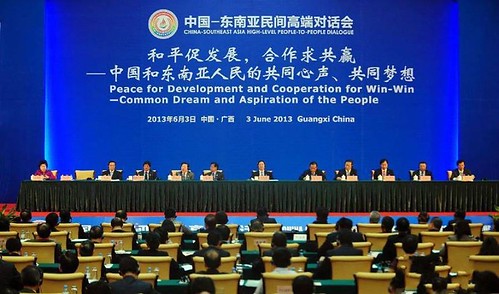
China-Southeast Asia High-Level People-to-People Dialogue Conference
On 3-4 June, China played host to the China-Southeast Asia High-Level People-to-People Dialogue Conference which was convened in Nanning, the capital of Guangxi Zhuang Autonomous Region. Both sides dispatched hundreds of participants, from the government, businesses, civil society organisations and non-governmental organisations to attend the meeting.
Liu Qibao, a member of the Political Bureau and minister of the Publicity Department of the Central Committee of the Communist Party of China, reiterated at the opening ceremony, “The trend of this new era - namely peace, development and win-win cooperation has been strengthened as the whole world is changing in a complicated way. China is willing to cooperate with Southeast Asia and its people to establish a region with sustainable peace and common prosperity.”
China has desperately attempted to reinvent its new image in Southeast Asia, a region long considered as the Chinese sphere of influence. As part of this effort, it recently proposed “the Chinese Dream” policy which stressed on China’s peaceful and civilised way to achieve national prosperity, national rejuvenation and the happiness of people in the region.
In the past decade, although the rise of China has been impressive, it has sent mixed messages to Southeast Asia. China’s economic growth has led to the continued modernisation of the army; this was most demonstrated in the aggressive policy toward territorial disputes in the South China Sea in which a number of Southeast Asian states have also claimed ownership.
Thus, the Nanning conference perfectly responded to the real need behind the image change, through a different approach in dealing with its Southeast Asian neighbours with the use of “soft power”. More communication and cooperation between people in China and Southeast Asian countries was encouraged, as shown in the theme of the conference, “Boosting Development through a Peace Deal and Achieving Positive Outcomes through Cooperation”.
Indeed, the Chinese soft power has been increasingly felt in the region. Taking Thailand as an example, successive Thai governments have welcomed China’s soft power with arms wide open. Patrick Jory argued that since the Chinese language has been re-introduced into Thailand’s schools and universities after a long period of official sanction, Chinese popular culture has been much celebrated, and imported Chinese soap operas have been highly popular.
New Chinese language schools were mushrooming in Bangkok and in major cities throughout the kingdom. “Thailand has been taking the Chinese language seriously, so seriously that Thaksin asked China to send teachers,” Michael Vatikiotis wrote. In January 2006, China’s Deputy Education Minister Zhang Xin-sheng was in Bangkok to sign an agreement to help train 1,000 Mandarin language teachers every year for Thailand. China also offered 100 scholarships for Thai students to study in China, and dispatched 500 young volunteers to teach Chinese in Thailand.
According to the Chinese Ministry of Education, Thai students studying in China reached 1,554, making them the sixth largest group of foreign students in the country, after South Korea, Japan, the United States, Vietnam and Indonesia. “The number of Thai students studying in Chinese universities has grown six- or seven-fold within the past few years,” said Tekhua Pung, director of a local Chinese-language teaching school.
In economic relations, Thailand and China have taken advantage from good ties at the national level to enhance economic activities. Many Thai cabinet ministers from and powerful businesses have significant investments in China. Thailand’s Charoen Pokphand (CP), one of Southeast Asia’s largest companies, has been doing business in China since 1949. Bangkok Bank still has the largest foreign bank branch on Shanghai’s Bund waterfront, only recently have a few other foreign banks gained token footholds on China’s preeminent address.
Activities between Thai and Chinese business conglomerates are regularly conducted, with the exchange of visits and the sharing of business information. The Thai-Chinese Chamber of Commerce highlighted in its website that “all business activities must remain apolitical”, thus emphasising its important no-politics motto.
China’s foreign aid has also had a growing, tangible impact in Thailand and many countries in Southeast Asia. China has administered a wider range of economic assistance that includes non-development aid and low-interest loans, as well as trade and investment agreements. When these kinds of assistance are totalled, China becomes one of the largest bilateral aid donors in Southeast Asia.
Furthermore, China offers assistance without the conditions that other donors frequently place on aid, such as democratic reform, market opening, and environmental protection, therefore reflecting China’s own policy of “non-interference in domestic affairs” which often wins friends not only among Southeast Asian governments but also by many peoples in the region because it is regarded as respectful of their countries’ sovereignty.
But soft power alone has not been able to guarantee a friendly reception among Southeast Asians who have continued to perceive China with suspect and fear. This is why the Nanning Conference was an essential policy tool of China vis-à-vis Southeast Asia.
The China-Southeast Asia High-level People to People Dialogue was initiated by the Network for International Exchanges (CNIE), a Chinese non-governmental organisation—a platform to promote regional cooperation and development between China and Southeast Asia.

Pavin Chachavalpongpun is associate professor at Kyoto University’s Centre for Southeast Asian Studies.

